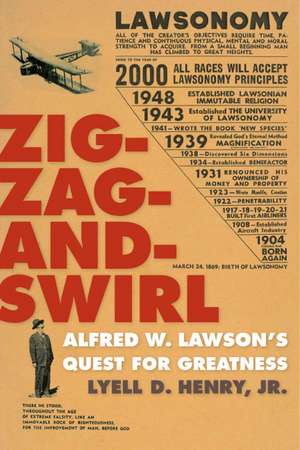Zig-Zag-and-Swirl: Alfred W. Lawson's Quest for Greatness
Autor Lyell D. Henryen Limba Engleză Paperback – iun 2009
Alfred W. Lawson (1869–1954) was a professional baseball player, inventor of the airliner, leader of a movement in the 1930s calling for the abolition of banks and interest, and founder of a utopian community, the so-called Des Moines University of Lawsonomy. This unusual institution, constantly embroiled in controversy in the 1940s and early 1950s, was dedicated not only to teaching Lawson’s novel religious and scientific ideas but also to initiating a reform of human nature.
Preț: 200.84 lei
Nou
Puncte Express: 301
Preț estimativ în valută:
38.43€ • 40.23$ • 31.80£
38.43€ • 40.23$ • 31.80£
Carte indisponibilă temporar
Doresc să fiu notificat când acest titlu va fi disponibil:
Se trimite...
Preluare comenzi: 021 569.72.76
Specificații
ISBN-13: 9781587294662
ISBN-10: 1587294664
Pagini: 336
Ilustrații: 33 photos, 9 drawings
Dimensiuni: 152 x 229 x 23 mm
Greutate: 0.59 kg
Ediția:1
Editura: University of Iowa Press
Colecția University Of Iowa Press
ISBN-10: 1587294664
Pagini: 336
Ilustrații: 33 photos, 9 drawings
Dimensiuni: 152 x 229 x 23 mm
Greutate: 0.59 kg
Ediția:1
Editura: University of Iowa Press
Colecția University Of Iowa Press
Recenzii
"All students of outrageous humbug will be indebted to Lyell Henry for a difficult job well done. Alfred Lawson's whole incredible story is here, in one of the most amusing biographies of the last few decades."—Martin Gardner
Notă biografică
Lyell Henry is professor emeritus of political science at Mount Mercy College. He is also the author of Was This Heaven? A Self-Portrait of Iowa on Early Postcards (Iowa, 1995) and of articles on various topics of American popular culture. He lives in Iowa City with his wife, Gretchen, and two cats.
Descriere
Alfred W. Lawson (1869–1954) was a professional baseball player, inventor of the airliner, leader of a movement in the 1930s calling for the abolition of banks and interest, and founder of a utopian community, the so-called Des Moines University of Lawsonomy. This unusual institution, constantly embroiled in controversy in the 1940s and early 1950s, was dedicated not only to teaching Lawson’s novel religious and scientific ideas but also to initiating a reform of human nature.
